�
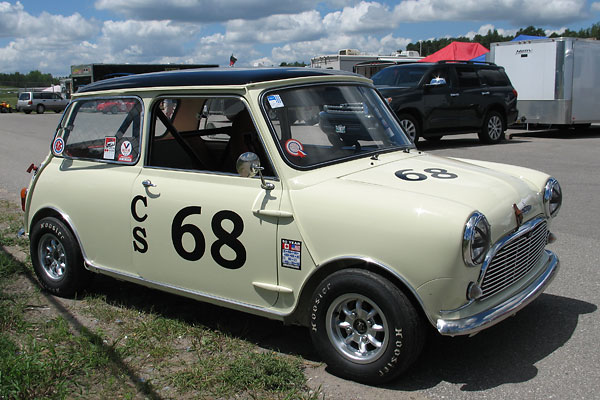
�
Rachel Nelson's 1965 Austin Cooper S Racecar
� ��
Owner: Rachel Nelson
�
City: Grimsby, Ontario
�
Model: 1965 Austin Cooper S
�
Engine: BMC A-Series 1275cc four cylinder
�
Prepared by: Andy and Rachel Nelson (a.k.a. Toybox Racing)�
�
Rachel's Cooper S Vintage Racer: Car Number 68
��
This is one of two Mini racecars owned and driven by the family racing team of Rachel and�
Andy Nelson. It's usually driven by Rachel, while Andy usually drives a 1965 Mini which�
wears racing number 921. What really stands out about Rachel's Mini, as you'll see in the�
photos below, is a level of detailing and aesthetic perfection one might associates with a�
show car. It carries a bit more trim than is strictly necessary, but don't let that fool�
you. This car has been raced since it was brand new in 1965, it's a serious racecar, and�
its pretty quick!�
�
Rachel and Andy purchased the number-68 Mini in February 2005. Between November 2005 and�
August 2006 they completed its very extensive restoration. Since then, the Nelson's have�
typically raced between two and four weekends a year. They've have raced with Vintage Automobile�
Racing Association of Canada, the Sportscar Vintage Racing Association, and the Vintage�
Racer Group at venues including Laguna Seca, River's Edge (in British Columbia), Mosport,�
Brainerd, and Watkins Glen.�
�
�
 �
�
�
�
�
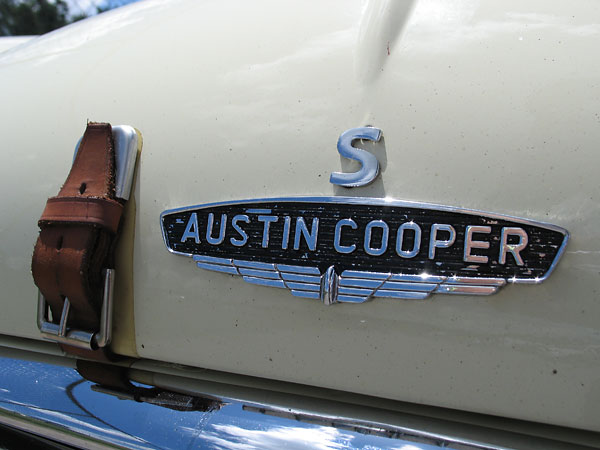
�
1965 Austin Cooper S badges.
�
�
Austin records (available from The British Motor Industry Heritage Trust) show that�
this little car was built on April 8th, 1965 and dispatched to a dealership in Portland,�
Oregon on April 25th. The original purchaser was Gordon "Red" Schimberg, of Ashland,�
Oregon who raced the car extensively from the time it was new. He qualified to race�
in the 1966 ARRC at Riverside (placed 9th in CS), the 1967 ARRC at Daytona (CS, 9 laps�
before a DNF), and the 1968 ARRC at Riverside (placed 14th in CS). Red also raced the�
Mini at Cotati, Pacific Raceways, Sears Point, Newport, Shelton, Portland International�
Raceway (West Delta Park), and many other venues between 1965 and 1970.�
�
Our photos show Rachel's Mini as presented in June 2010. Since then, rules have shifted�
and so have priorities. Now that VARAC allows roller rockers in the engines valvetrain�
and Heim joint type rod ends on suspension components, Rachel and Andy are able to race�
under either VARAC or SVRA rules so they decided to put the number 68 Mini on a tough diet.�
It was a hefty 1450 lbs without driver or fuel. Now they've taken out trim such as door�
cards, carpet, rear seat, boot liner, license plate holder, lamp assemblies, etc., and�
also switched out the Hydrolastic suspension. They've added fender flares so they can�
run CMW 6" rims, which are lighter than Minilites. So far, weight reductions have totaled�
up to about 100 pounds.�
�
Please support the sponsoring companies who make www.BritishRaceCar.com possible, including:
� �
 �
�
�
�
Features and Specifications (as photographed in 2010)
�| Engine: | �BMC A-Series 1275cc four cylinder engine, bored to 1312cc.�
Ivey forged EN40B crankshaft.�
Fortech Racing center main bearing cap.�
Swiftune front & rear main bearing caps.�
Pauter chrome moly alloy billet connecting rods.�
Omega forged pistons (+0.040") with a custom 5cc dish. �
Swiftune cylinder head.�
Swiftune SW23-SP "Historic Race" 300 degree billet camshaft, drilled for pressure oiling.�
Swiftune 1.5:1 roller rockers.�
Match-ported intake manifold.�
Dual S.U. HS4 (AUD 135F and AUD 135R) carburetors.�
ITG foam air filters.�
Lucas distributor with Pertronix Ignitor breakerless module.�
Lucas "bumble bee" spark plug wires with NGK terminations.�
Accusump, with electric solenoid actuated valve.�
| �
| Cooling: | �stock copper and brass downflow radiator.�
Stock style engine driven cooling fan.�
13-row oil cooler. | �
| Exhaust: | �Maniflow large bore, long center branch header.�
Ceramic header coating.�
RC40 center exit muffler. | �
| Transmission: | �Swiftune straight cut gears.�
Evolution (Salisbury type) limited slip differential.�
Swiftune Featherlight flywheel.�
CV joints. | �
| Front Susp.: | �Hydrolastic suspension, with fluid pressure pumped up to 240psi.�
KONI telescoping shock absorbers.�
1/8" toe-in.�
1.5° negative camber.�
4.5° positive caster. | �
| Rear Susp.: | �Hydrolastic suspension.�
Anti-sway bar.�
0" toe-in.�
0.5° negative camber. | �
| Brakes: | �(master) stock Lockheed master cylinder. ATE Super Blue racing fluid. � (front) Lockheed Cooper S single piston calipers. Goodridge braided stainless hoses. Solid rotors. � (rear) stock drum brakes. | �
| Wheels/Tires: | �Minilite 10x5 8-spoke aluminum wheels.�
Hoosier T.D. 165/70-10 tires. | �
| Electrical: | �Odyssey PC680 sealed drycell battery (15.4lb).�
Lucas alternator. | �
| Instruments: | �(left to right)�
AutoMeter Sport-Comp II tachometer (0-10000rpm) with programmable shift light,�
Smiths oil temperature gauge (0-140C),�
Smiths speedometer (0-130mph),�
Smiths dual oil pressure (0-100psi) and water temperature gauge (0-230F). | �
| Fuel System: | �ATL SP105-AC fuel cell.�
Holley "red" electric fuel pump.�
Mr Gasket fuel filter.�
Holley low pressure adjustable fuel pressure regulator.�
| �
| Safety Eqmt: | �Pyrotech five point cam-loc safety harness.�
Cobra racing seat (recovered to match other interior trim.)�
Momo suede covered ergonomic steering wheel.�
Firecharger 2.3L AFFF centralized fire suppression system.�
Amerex hand-held fire extenguisher.�
Wink mirror. | �
| Weight: | �1450 lbs | �
Engine Installation
��
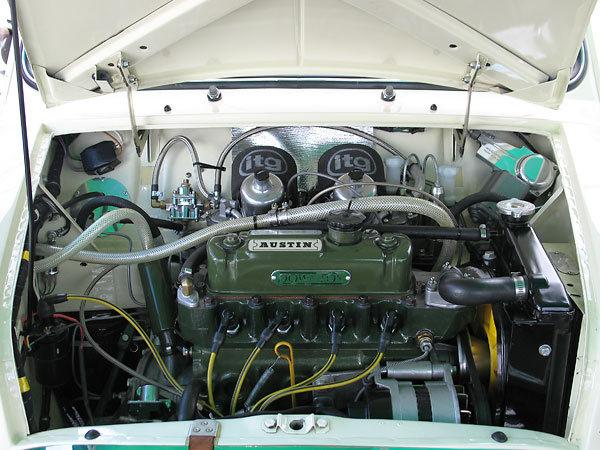
�
BMC A-Series 1275cc four cylinder engine.
�
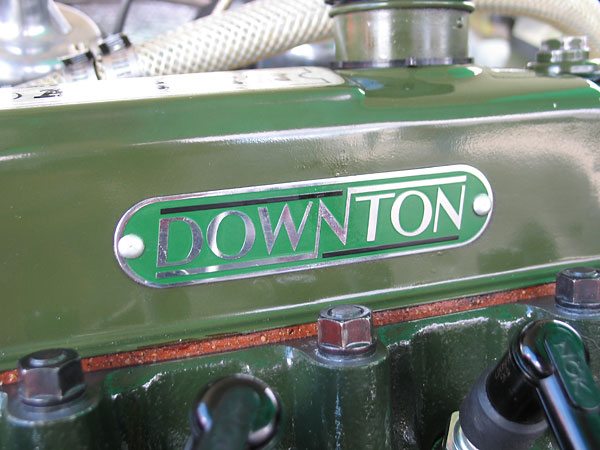
�
Downton Engineering Works of Wiltshire was the most successful and respected performance
�
tuner of Minis and other BMC products from the fifties through shop closure in 1976.
�
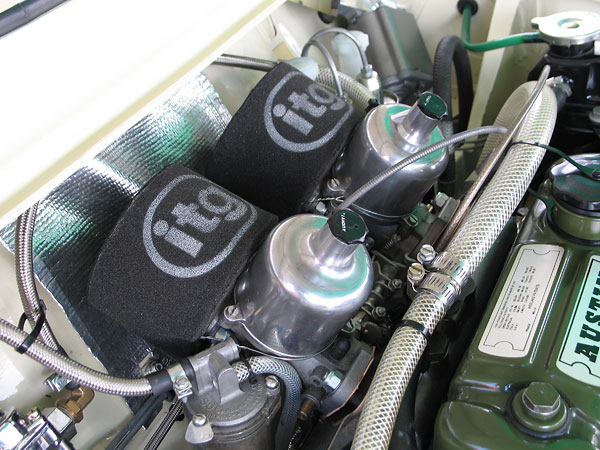
�
Dual S.U. HS4 (AUD 135F and AUD 135R) carburetors. ITG foam air filters.
�
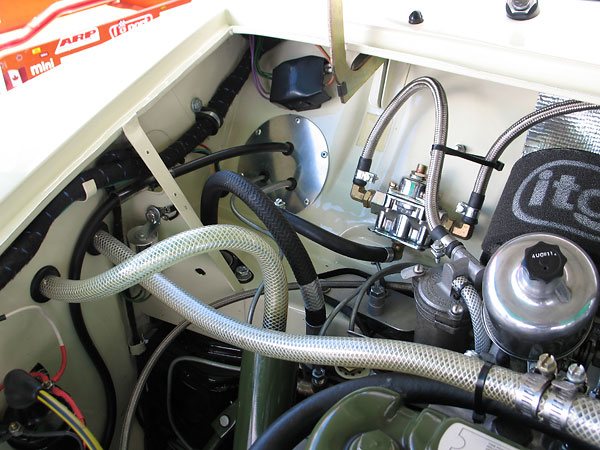
�
Holley low pressure adjustable fuel pressure regulator.
�
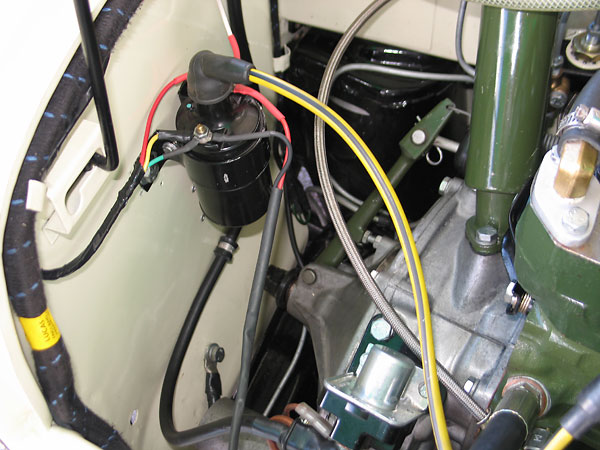
�
Ignition coil.
�
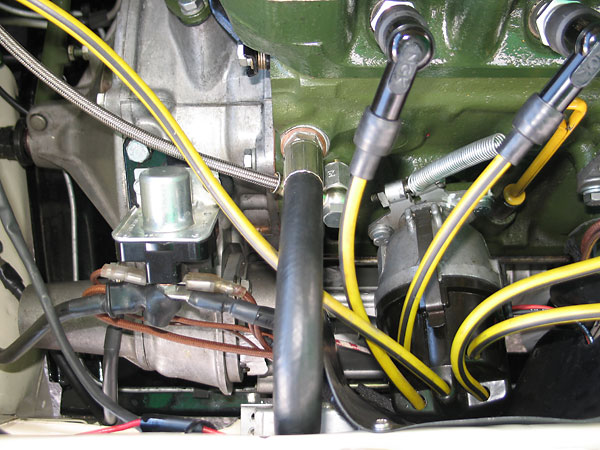
�
Lucas distributor updated with Pertronix Ignitor breakerless module.
�
Lucas "bumble bee" spark plug wires, installed with NGK terminations.
�
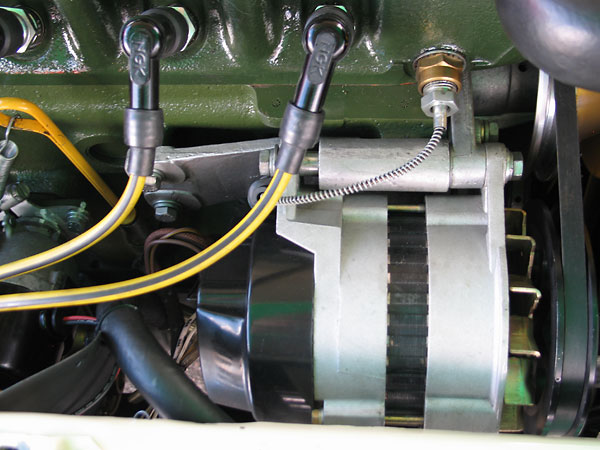
�
Lucas alternator.
�
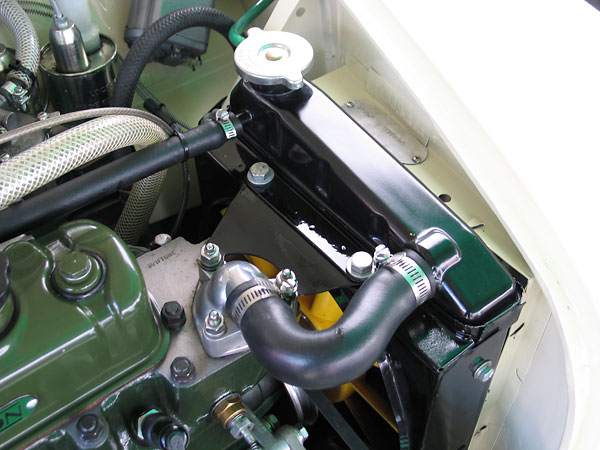
�
Stock style copper and brass downflow radiator and engine driven cooling fan.
�
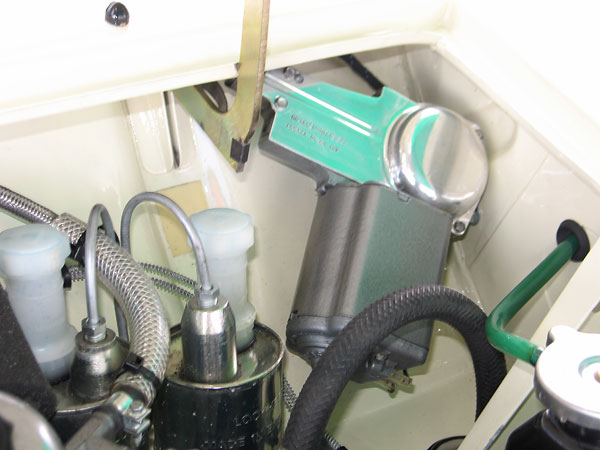
�
Lucas windshield wiper motor.
�
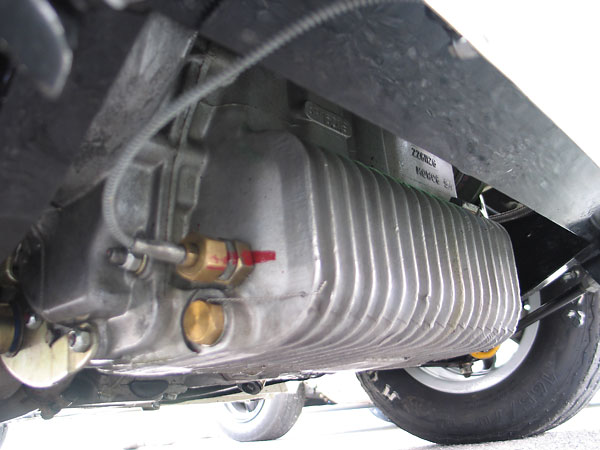
�
The Mini's distinctive finned aluminum gearbox case.
�
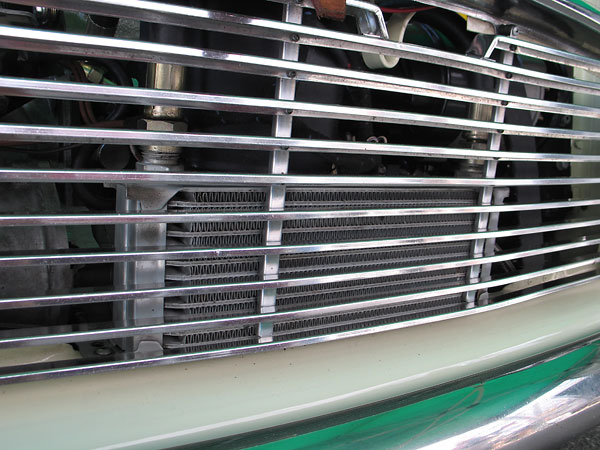
�
13-row oil cooler.
�
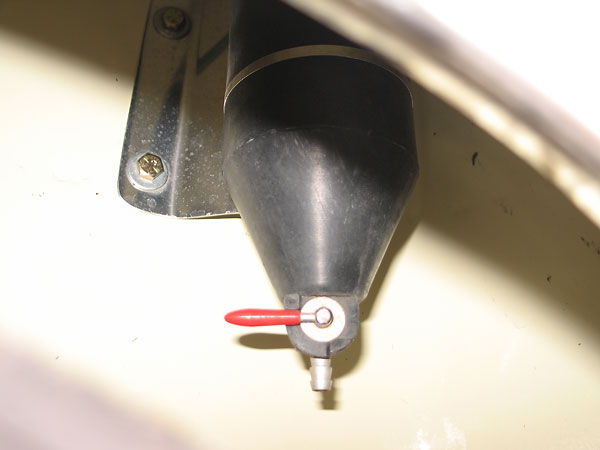
�
Two liter plastic oil catch tank with drain.
�
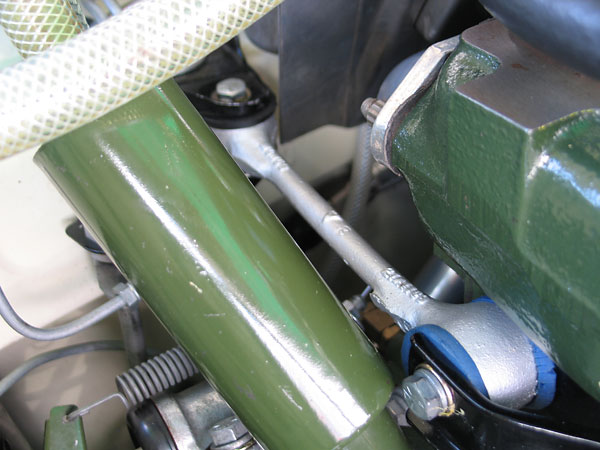
�
Original engine steady bar, but with urethane bushing.
�
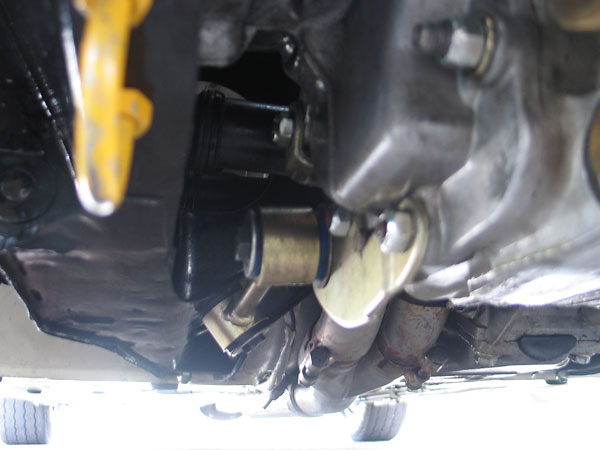
�
Accessory engine steady bar.
�
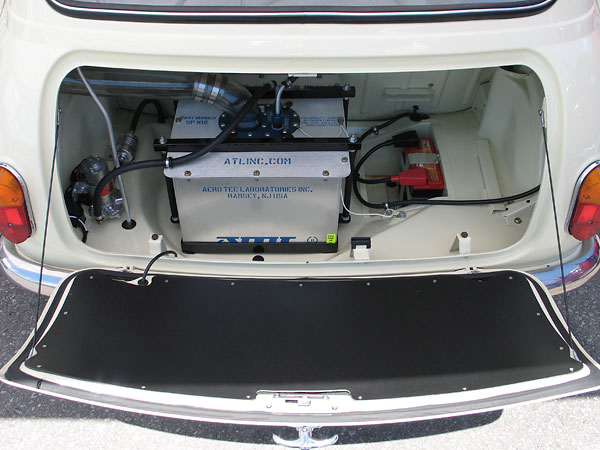
�
ATL SP105-AC fuel cell.
�
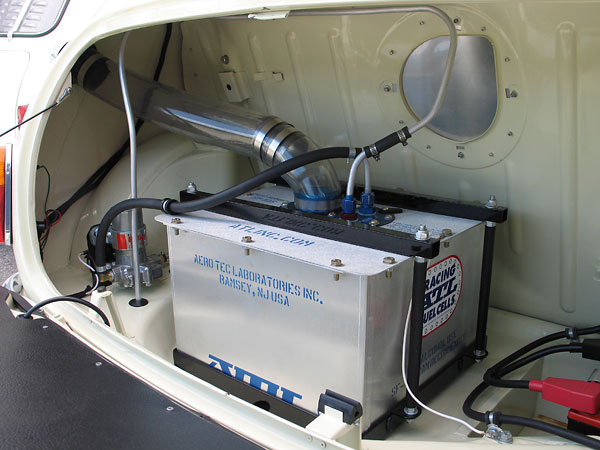
�
The ATL fuel cell is available with either a steel or an aluminum cannister.
�
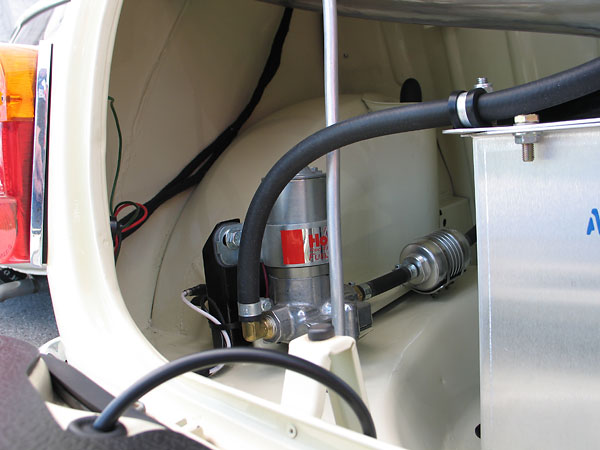
�
Holley "red" electric fuel pump and Mr Gasket fuel filter.
�
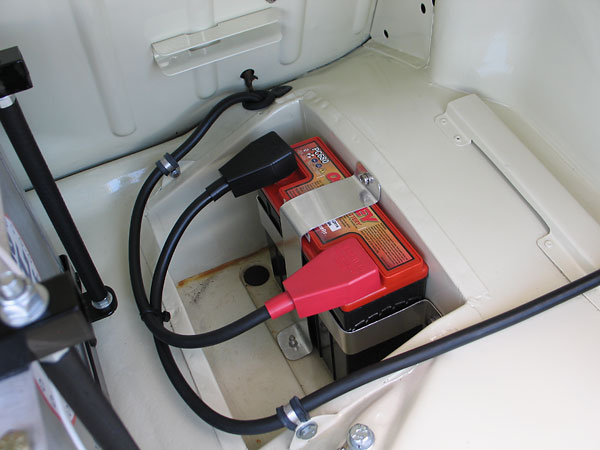
�
Odyssey PC680 sealed drycell battery.
�
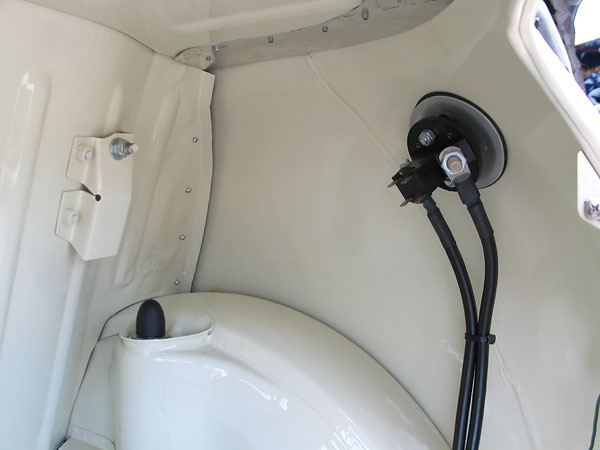
�
Battery disconnect switch. Notice that this device has extra (unconnected) spade terminals. Internally
�
it has a separate switch contacts for grounding the ignition coil and alternator as appropriate.
�
�
Front Suspension / Etc.
��
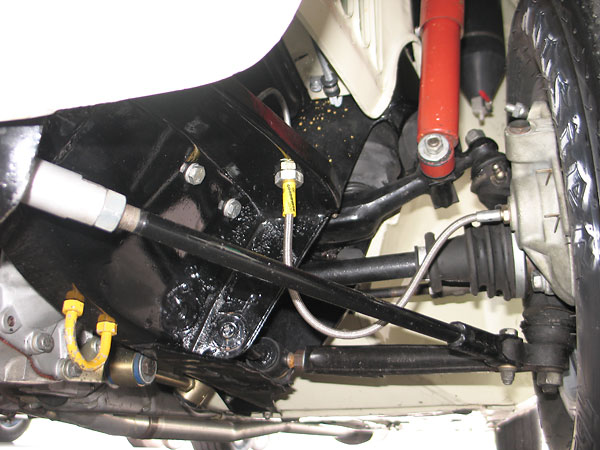
�
Classic Mini suspensions never relied on steel springs! Minis built from 1965 through 1971 were equipped
�
with Hydrolastic suspension systems whereas earlier and later Minis were suspended on engineered
�
rubber cones. Hydrolastic bags provide some compliance but this high pressure system mainly relies on
�
transfer of fluid between corners of the car. Bonus: the Hydrolastic suspension system is self-leveling.
�
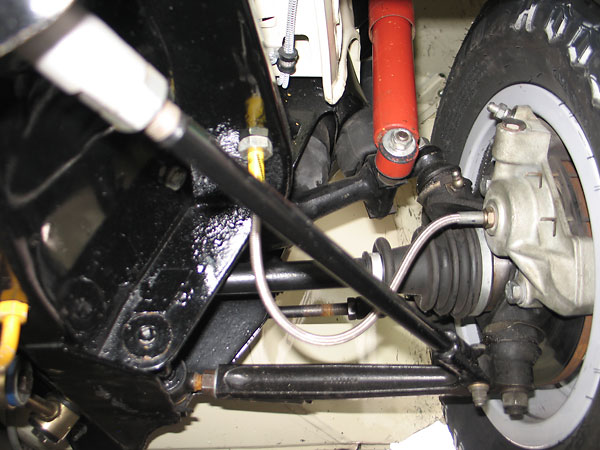
�
Lockheed Cooper S single piston calipers. Goodridge braided stainless hoses. Solid rotors.
�
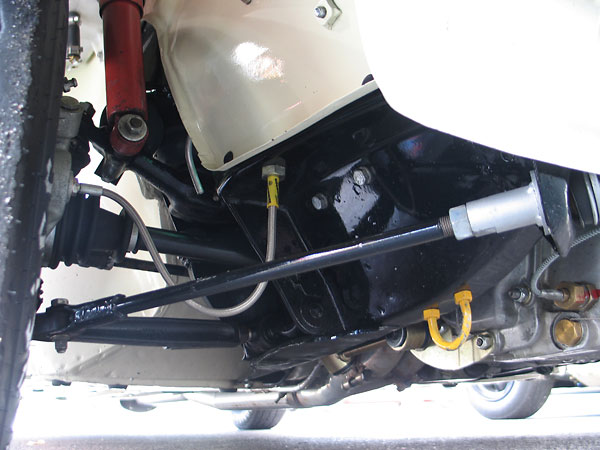
�
For the 2011 season Rachel upgraded inboard connections on the lower control arms from stock rubber
�
bushes to Heim joints. Result: more precise set-up and handling with some weight savings as a bonus.
�
�
IMPORTANT ANNOUNCEMENT
�
BritishRaceCar.com will have to cut back plans for continued growth if we can't find more financial support.
�
If you like what you've found here, and you want to see more, please click here and follow the instructions.
�
Readers like you keep BritishRaceCar.com online and growing through voluntary financial contributions.
�
Rear Suspension
��
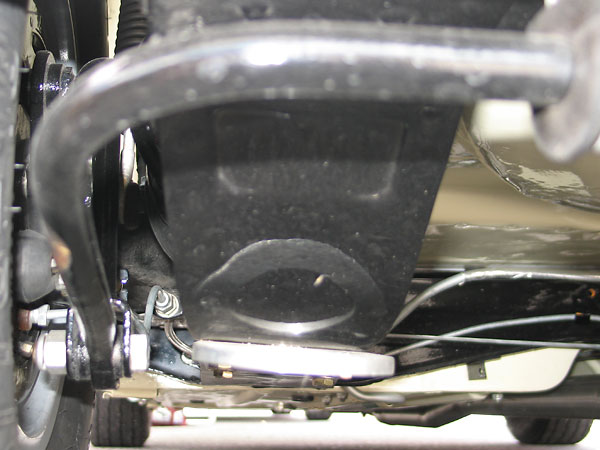
�
The shaped rubber cones used on Minis for most of their 1959-2000 production life were engineered
�
to achieve a rising wheel rate and natural dampening. Ride quality wasn't great, but it was deemed
�
acceptable. Simple, lightweight, and space-saving, the rubber cone suspension gave the Mini its
�
famous "go-cart handling". Both suspensions were co-developed with Moulton Developments Ltd.
�
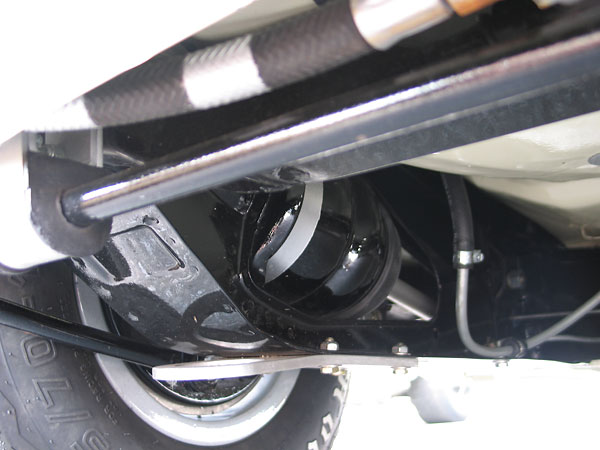
�
Through 2010, Rachel Nelson's Mini was one of only a very small handful of Minis racing in
�
North America on a Hydrolastic system. Most 65-71 Mini racecars had already been converted
�
to rubber cones. After we took our photos, Rachel switched over too.
�
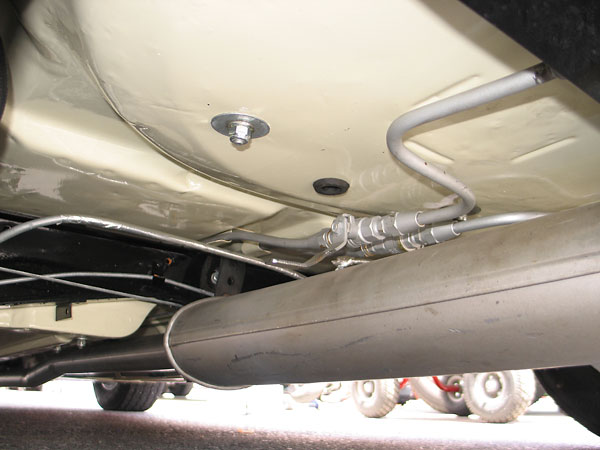
�
Valves on the control lines allowed Rachel to defeat the transfer of Hydrolastic
�
fluid between front and rear. With valves closed the system was more go-cart like.
�
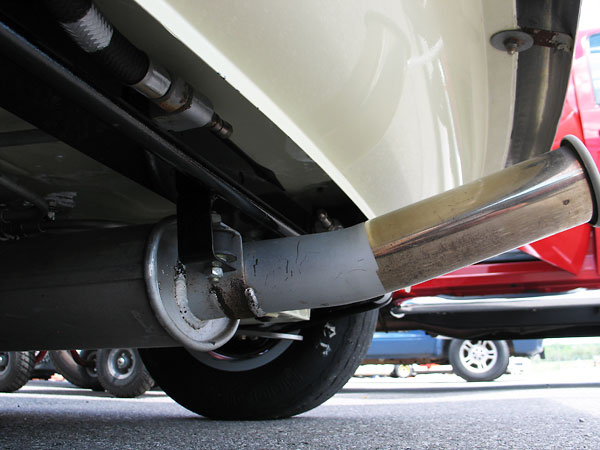
�
RC40 center exit muffler.
�
�
Interior
��
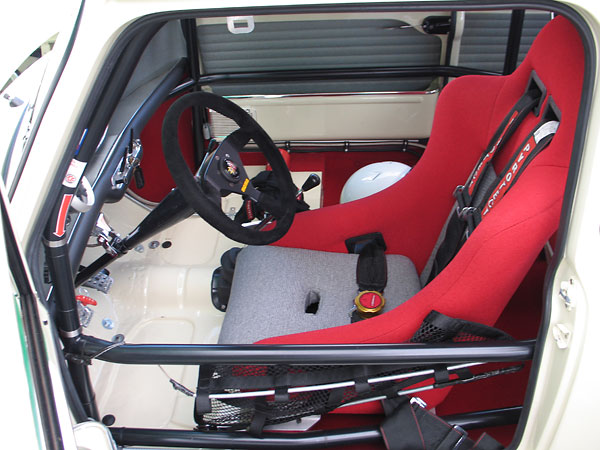
�
Cobra racing seat (recovered to match other interior trim.)
�
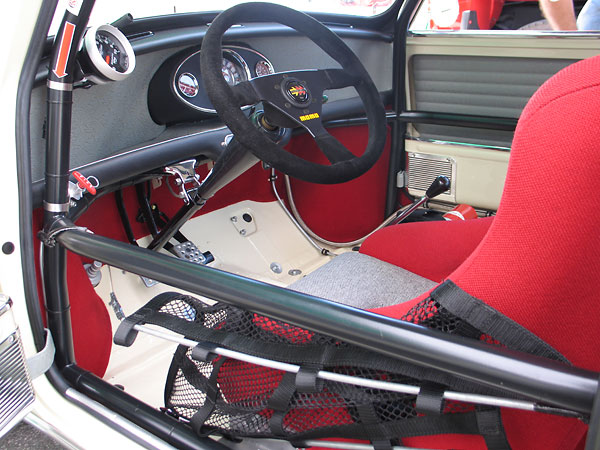
�
Specialty Engineering in Delta, British Columbia installed this six point roll cage.
�
It has two side-intrusion protection bars on the drivers side, and one for the passenger.
�
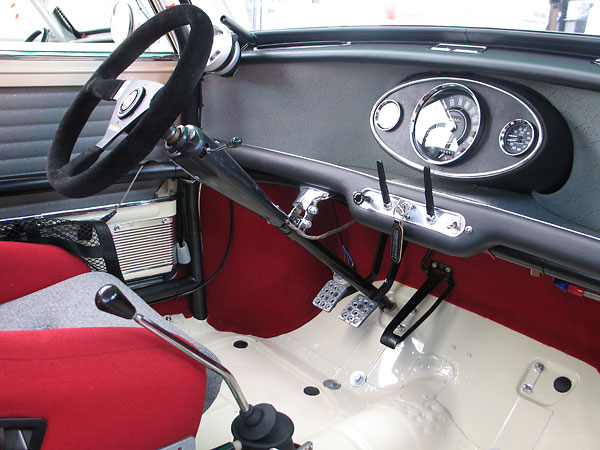
�
Extended pedals.
�
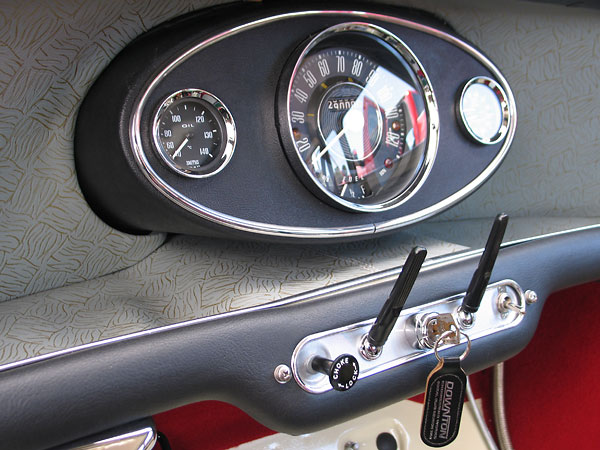
�
Smiths oil temperature gauge (0-140C), speedometer (0-130mph), and dual
�
oil pressure (0-100psi) and water temperature gauge (0-230F).
�
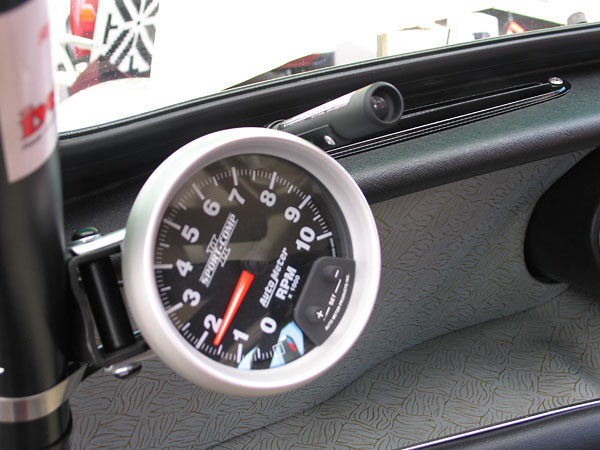
�
AutoMeter Sport-Comp II tachometer (0-10000rpm) with programmable shift light.
�
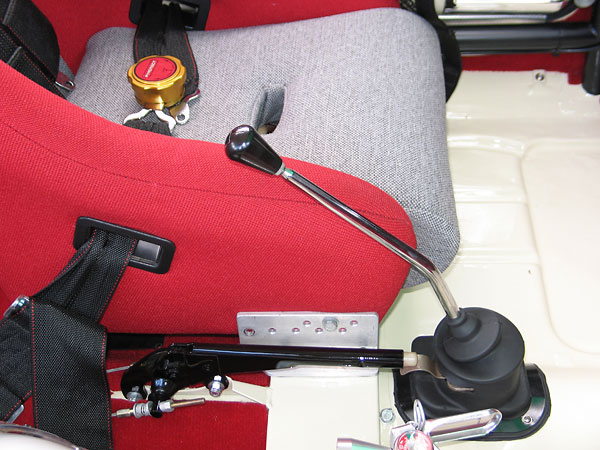
�
Since both Rachel and her husband drive the car, they needed an adjustable seat mount.
�
It wasn't much harder to have eight installation positions instead of just two.
�
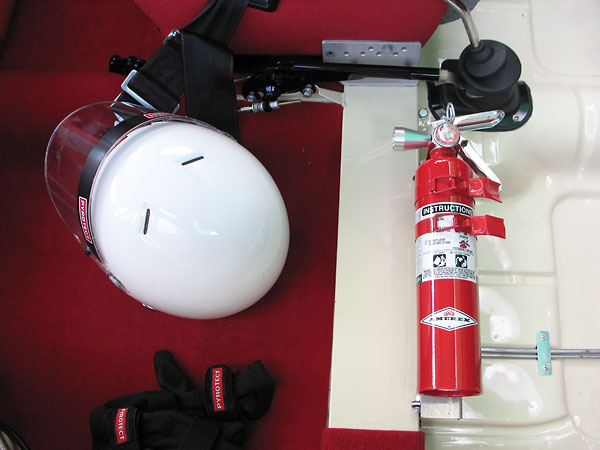
�
Amerex hand-held fire extenguisher.
�
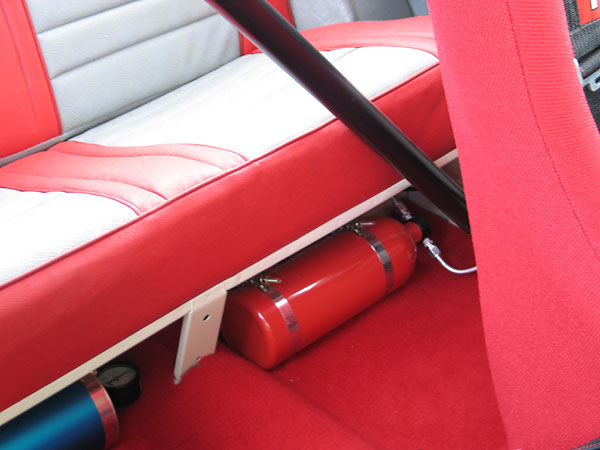
�
Bottle for the Firecharger 2.3L AFFF centralized fire suppression system.
�
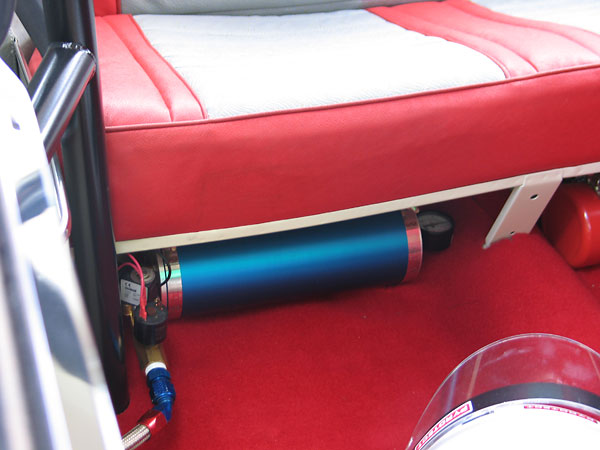
�
Accusump, with electric solenoid switch.
�
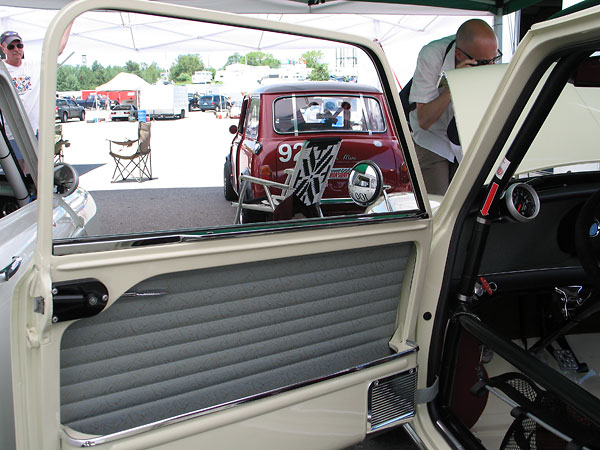
�
Minis came with sliding door windows through the 1967 model year.
�
(Obviously Rachel's door windows have been removed for racing.)
�
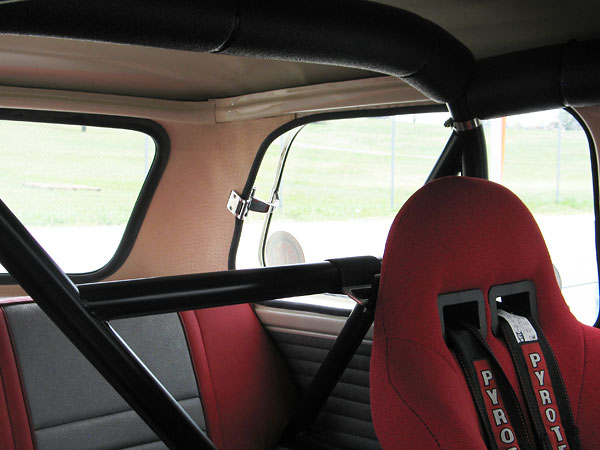
�
Shoulder harness straps wrap neatly around one of the rollcage's horizontal bars.
�
�
Exterior
��
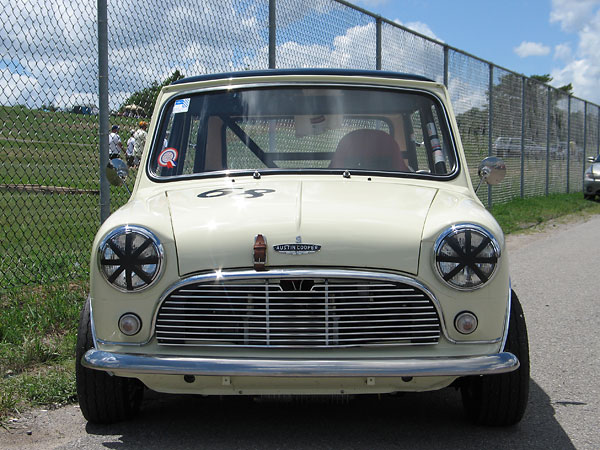
�
We enjoyed watching Rachel compete in VARAC's 31st International Vintage Festival at
�
Mosport International Raceway on June 20, 2010. She lapped the challenging 2.458 mile
�
circuit quite quickly at 1:52.48 for an average speed around the circuit of 78.67mph.
�
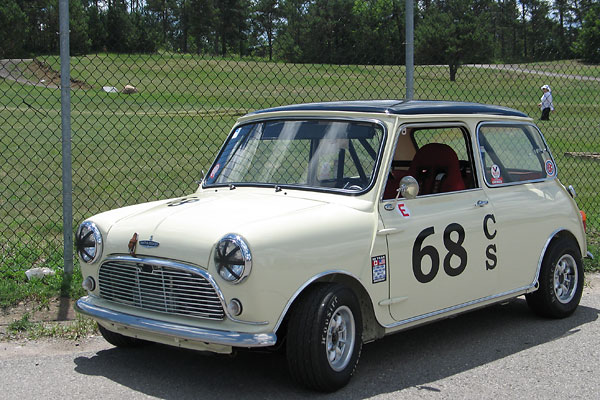
�
The fastest lap time set by any Mini that weekend was 1:44.57 by Rachel's husband Andy
�
who drives a much more highly modified and developed car. Twelve Minis participated.
�
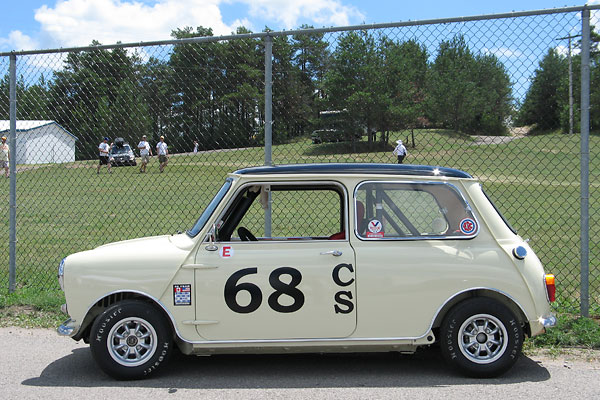
�
This car has been raced since it was brand new in 1965!
�
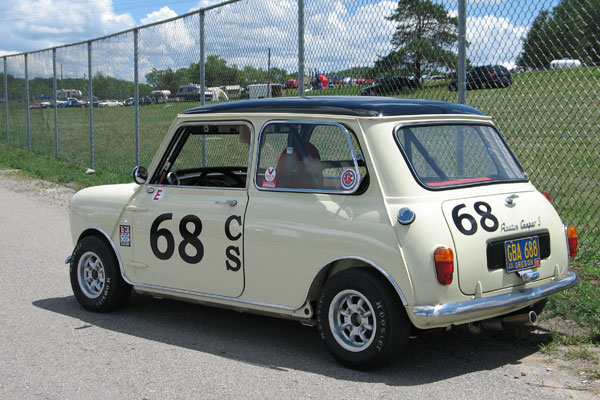
�
Rachel's Cooper S is shown here with its original Oregon license plate: number GBA688.
�
(Rachel was skeptical, so she wrote the Oregon D.O.T. and verified the plate's authenticity.)
�
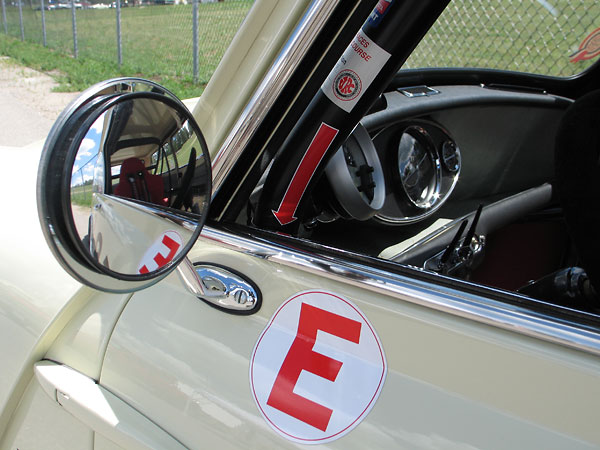
�
Convex mirror.
�
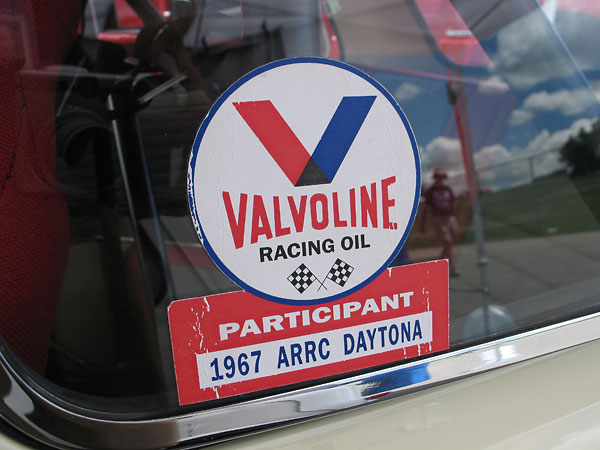
�
Valvoline Racing Oil - Participant - 1967 AARC Daytona
�
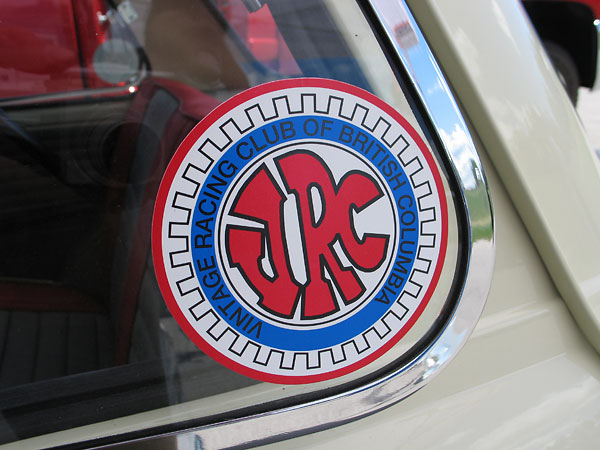
�
VRC: Vintage Racing Club of British Columbia
�
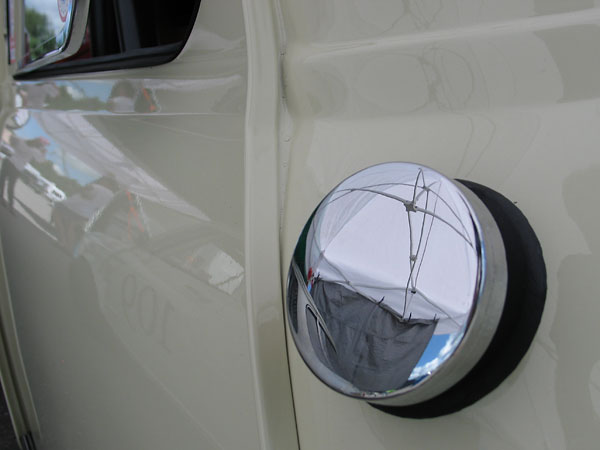
�
Polished stainless steel fuel filler cap.
�
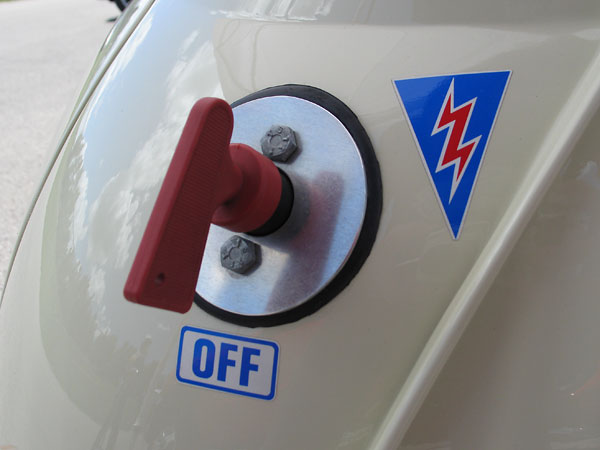
�
Emergency battery disconnect switch.
�
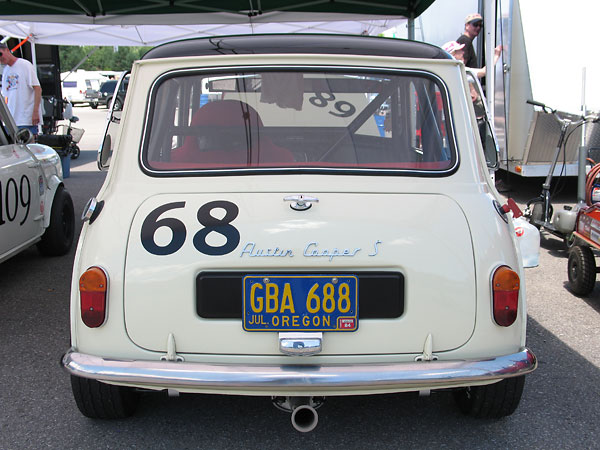
�
Austin Cooper S badging. The name "Mini" encompasses all the many variants of this hugely popular car.
�
At launch, Austin called their version the "Austin Seven" and Morris used the model name "Mini Minor".
�
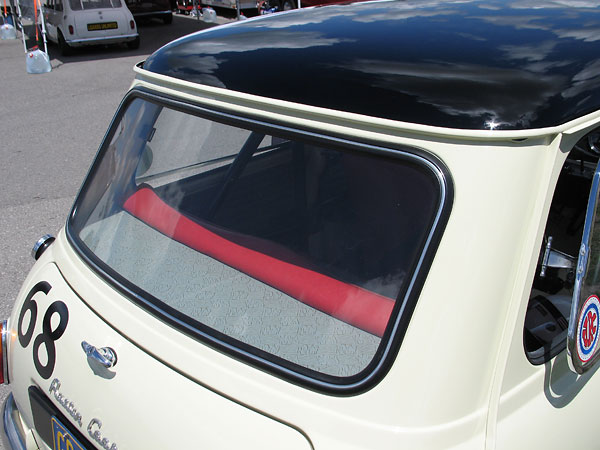
�
Rear window glass is heavy, so since this photo was taken Rachel has replaced it with
�
Makrolon, which is a particularly scratch resistant plastic.
�
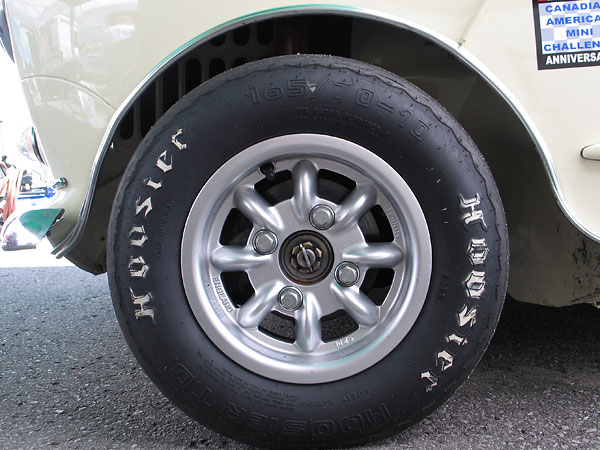
�
Minilite 10x5 8-spoke aluminum wheels.
�
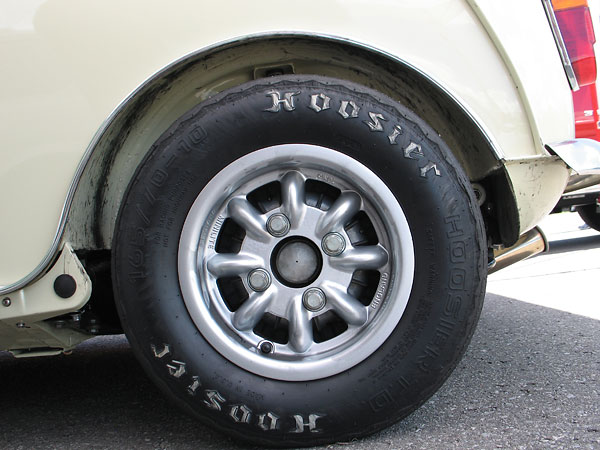
�
Hoosier T.D. 165/70-10 tires.
�
�
All photos shown here are from June 2010 when we viewed the car at VARAC's 31st International Vintage Festival�
at Mosport International Raceway, near Toronto Ontario. Photos by Curtis Jacobson for BritishRaceCar.com, �
copyright 2011. All rights reserved.
�
| If you liked this article, you'll probably also enjoy these: | �|||||
 | �
Bruce McCalister '68 Austin Mini | �
 | �
Bob Polak '69 Mini Marcos | �
 | �
Walter Davies '73 Ford RS1600 | �
| You're invited to discuss anything you've seen here on The British Racecar Motorsports Forum! | �|||||
�
Notice: all the articles and almost all the photos on BritishRacecar.com are by Curtis Jacobson.
�
(Photos that aren't by Curtis are explicitly credited.) Reproduction without prior written permission is prohibited.
�
Contact us to purchase images or reproduction permission. Higher resolution images are optionally available.
�

 �
�